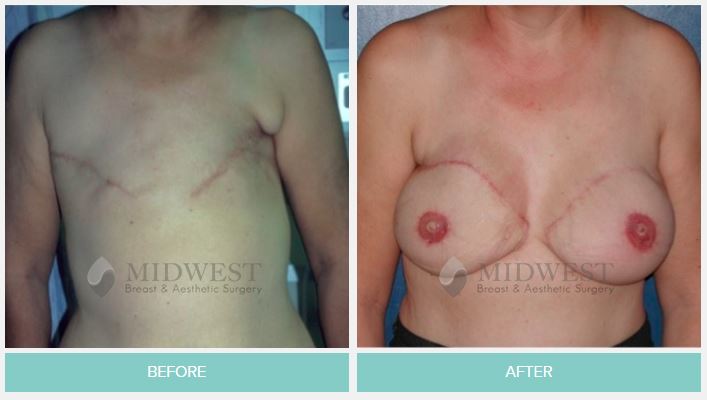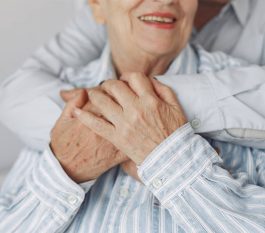 Many of our patients who chose to undergo mastectomy usually end up removing their nipple and areola. As a result, they often decide to have nipple reconstruction surgery to create a new nipple or restore nipple sensitivity and its original appearance. In some cases, mastectomy spares the nipple and areola area, making the nipple reconstruction unnecessary.
Many of our patients who chose to undergo mastectomy usually end up removing their nipple and areola. As a result, they often decide to have nipple reconstruction surgery to create a new nipple or restore nipple sensitivity and its original appearance. In some cases, mastectomy spares the nipple and areola area, making the nipple reconstruction unnecessary.
Nipple reconstruction involves rebuilding a nipple shape from the surrounding tissue on the reconstructed breast. The procedure attempts to recreate the appearance of an elevated nipple and a dark-colored areola.
Although patients can expect to have a natural-looking nipple after a successful reconstruction, it is essential to bear in mind that the reconstructed nipple is not likely to have full sensation. Even after nipple-sparing mastectomy, the nipple may regain some feeling but will not typically regain the full sensation.
Nipple Reconstruction & Other Resources

Learn more about Nipple Reconstruction Visit our resources page
Why Numbness Occurs
A loss or decrease in nipple sensitivity after reconstruction and nipple-sparing mastectomy results from cutting the nerves that give the breast and nipple feeling.
Even though we can successfully recreate the shape and look of a nipple through reconstruction, the primary sensory nerve supply cannot be reestablished, causing numbness and altered sensibility.

What to Expect After Surgery
Other than a temporary or permanent loss of nipple sensitivity, other expected effects that could happen after a mastectomy include:

Burning Sensation
Feeling a burning sensation after a mastectomy is normal when patients are still early in their post-operation or healing process. Nerve pain causes the burning but will eventually get better with time. During this period, we recommend that patients consult with their surgeons regularly.

Chest numbness
Aside from losing nipple sensitivity, experiencing chest numbness after a mastectomy is also common. In the first 3 — 4 months after surgery, it is normal for patients to feel swollen and have bruises and open wounds. The numbness in the chest is related to swelling but will likely improve in a few weeks or months.

Underarm numbness
On the other hand, underarm numbness after mastectomy may take longer to recover, if at all. Underarm numbness occurs because the axillary lymph node dissection sometimes sacrifices the sensory nerve in the inner arm. During this process, losing sensation is more likely to disrupt the tissues under the armpit. The resulting lack of feeling could be permanent but can improve depending on how fast the surrounding nerves regenerate. Because of this, sensation may eventually return, but it will take time.

Nerve pain
For patients who choose to have a DIEP flap reconstruction, nerve pain can be a common effect. DIEP flap nerve pain occurs when sudden movements pull scar tissue in the abdominal region, which causes the sensory nerves to become inflamed—resulting in sharp “stabbing” pains in the area from where the flap tissues were taken.
How to Cope After Surgery
As much as mastectomy and nipple reconstruction may physically affect a patient’s life, the emotional impact is also significant. Understanding the psychological effects of mastectomy is a crucial step in preparing for any surgery.
Although the emotional effects of mastectomy are different for every patient and vary in degree from one individual to the next, the typical effects include:

Distorted self-image
With removing one or both breasts may come the feeling of being less womanly and not being “whole.” However, accepting this new change and learning to feel comfortable with your new body is part of the healing process. Talking to other patients can help establish a sense of belongingness, knowing that you are not alone. Connecting with survivors can help you learn how they coped with the effects of their surgery.

Changes in sex and sexuality
As discussed earlier, a possible surgery effect is the loss of breast and nipple sensitivity. It is essential to be open and communicate honestly with your partner during this time if you feel like the change will be an issue. Such communication can help maintain a healthy relationship between you and the people around you.

Depression
Having feelings of despair and frustration is typical throughout the healing process. When these feelings hinder how you function in daily life, you might be experiencing depression. If these feelings do not change or become better over time, it is best to seek professional help.
Establishing A Sense of Completeness
Many of the emotional effects mentioned above can be affected by breast and nipple reconstruction. These procedures can help re-establish a sense of completeness if you feel that that is the best way to cope. Although a patient may experience loss of sensation post-surgery, some sensations may return after some time.
Before considering any reconstructive procedure, you must consult with a board-certified plastic surgeon.
Request Your Consultation
Make an appointment

Comments are closed here.